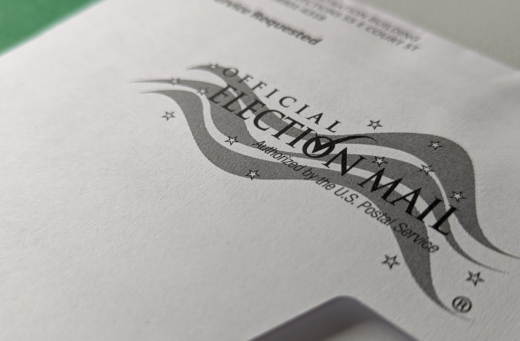By Peter Hall | Pennsylvania Capital-Star
State and county election officials violated the Pennsylvania Constitution by refusing to count mail-in ballots with missing or incorrect dates, a Commonwealth Court panel ruled last Friday.
In a 4-1 majority decision in favor of eight nonpartisan voting rights groups, the panel found that the requirement for mail-in ballots to have a handwritten date on the outer envelope serves no compelling governmental purpose.
Guidance by Secretary of the Commonwealth Al Schmidt, following earlier court rulings upholding the requirement, that instructed county boards of elections not to count ballots without a date is a violation of voters’ rights, the majority said.
“Simply put, the refusal to count undated or incorrectly dated but timely received mail ballots submitted by otherwise eligible voters because of meaningless and inconsequential paperwork errors violates the fundamental right to vote recognized in and guaranteed by the free and equal elections clause of the Pennsylvania Constitution,” Judge Ellen Ceisler wrote for the majority.
The decision can be appealed to the state Supreme Court.
In a separate unrelated filing Friday, Commonwealth Court President Judge Renee Cohn Jubelirer ordered Fulton County and a lawyer who represented two Republican county commissioners to pay more than $1 million in legal fees and costs to the state and Dominion Voting Systems.
The costs are related to an off-the-books 2020 election review orchestrated by state Sen. Doug Mastriano (R-Franklin), who is an ally of former President Donald Trump. The state Supreme Court sanctioned the GOP commissioners, the county and their attorneys for giving copies of voting machine hard drives to a Michigan-based forensic auditing company.
Pennsylvania’s vote-by-mail law has been the subject of litigation since it took effect in 2020 and voters took advantage of the new ability to vote early and without going to a polling place during the COVID-19 pandemic and the presidential election.
Most recently, the U.S. 3rd Circuit Court of Appeals ruled that the requirement for mail-in ballots to be dated did not violate ballot access provisions of the federal Civil Rights Act, reversing a lower court.
Voting rights advocates hailed the Commonwealth Court decision on Friday, which is the first time that a court has ruled on a challenge to the dating provision under the free and equal protections clause of the state constitution.
“Today’s decision is a win for voters and democracy. No one should lose their vote over a simple human error that has no relevance to whether or not the ballot was received on time. This decision preserves the votes of thousands of voters who make this mistake in every election, without undemocratic, punitive enforcement by the counties,” American Civil Liberties Union of Pennsylvania Executive Director Mike Lee said.
The ACLU of Pennsylvania, American Civil Liberties Union national organization, Public Interest Law Center, and the law firm Arnold & Porter Kaye Scholer represented the voting rights groups led by the Black Political Empowerment Project.
Lauren Cristella, president and CEO of the Philadelphia-based election watchdog group Committee of Seventy, which was not a party to the case, said the decision is an important milestone in safeguarding voters’ rights.
“Every voter should feel confident casting their ballot by mail, knowing that minor mistakes will not keep them from making their voice heard. We have always maintained that the requirement to date the mail-in ballot envelope is unnecessary and we are glad to see today’s Commonwealth Court decision confirm that long-standing belief,” Cristella said in a statement.
The Department of State, which weighed in on the side of the voting rights groups, called the decision a victory for the Constitution.
“This ruling makes clear a voter’s minor error of forgetting to date or misdating a ballot envelope cannot be a cause for disenfranchisement. Our Administration will always uphold Pennsylvanians’ right to vote and is pleased with today’s ruling,” the department said in a statement.
The state and national Republican parties intervened in the case to defend the dating provision. The state Republican party did not respond to a request for comment Friday afternoon.
In oral arguments Aug. 1, ACLU of Pennsylvania attorney Stephen Loney told the court the date requirement is “unique in its pointlessness and multiple courts have rejected arguments in defense of the rule. That includes the 3rd Circuit, which found that while the date is irrelevant to deciding whether a ballot is received on time, the rule did not violate federal law and should be enforced.
An attorney for Schmidt told the court earlier cases have established that county election officials don’t refer to the dates voters write on their ballots to determine whether a ballot is timely. Rather, ballots are stamped or otherwise recorded when they arrive in the election office and those that arrive after 8 p.m. on Election Day are not accepted, attorney Michael Fischer said.
John Gore, representing the state and national Republican parties, argued that the date requirement serves “unquestionable purposes” including as a backstop for failures in the election office’s system of recording when ballots are returned.
Judge Patricia McCullough who filed a dissenting opinion noted that many formal documents such as checks and contracts must be both signed and dated. Gore agreed, saying the requirement “drives home the solemnity of the voter’s choice to vote by mail rather than voting in person.” It also deters fraud, Gore said, noting that even though the ballot wasn’t counted, it took away a potential defense for the fraudster.
In her dissent, McCullough criticized the majority for applying the most restrictive level of constitutional review to what she described as “perhaps the least burdensome of all ballot-casting requirements.
“Today the Majority says that requiring the date on the voter declaration on a mail-in or absentee ballot envelope is subject to strict judicial scrutiny and cannot be enforced because doing so unconstitutionally denies the voting franchise altogether. I must wonder whether walking into a polling place, signing your name, licking an envelope, or going to the mailbox can now withstand the Majority’s newly minted standard,” McCullough wrote.
Bucks County Board of Elections Chairperson and Commissioner Vice Chairperson Bob Harvie released the below statement after the decision:
“The date requirement for mail-in ballots is a completely meaningless regulation that serves only to disenfranchise voters. We know when a voter applied for their ballot, we know when we printed the ballot, we know when we sent the ballot to the voter, and we know when the ballot came back to us. It is ludicrous then that a voter should have their otherwise lawfully cast ballot disqualified simply because it arrived in a misdated envelope, and I am heartened to see this ridiculous requirement struck down by the Commonwealth Court.”
Pennsylvania Capital-Star is part of States Newsroom, a network of news bureaus supported by grants and a coalition of donors as a 501c(3) public charity. Pennsylvania Capital-Star maintains editorial independence. Contact Editor Kim Lyons for questions: info@penncapital-star.com. Follow Pennsylvania Capital-Star on Facebook and Twitter.









